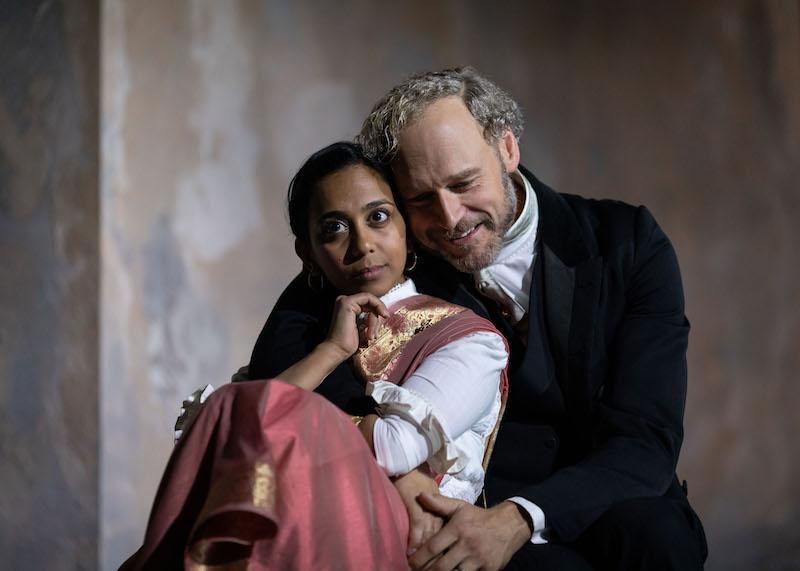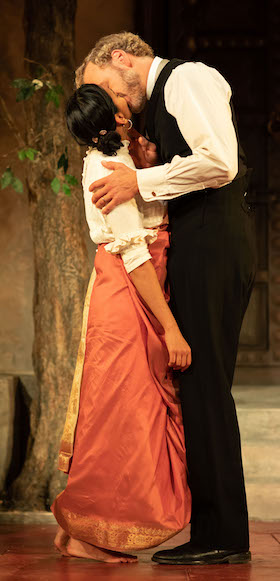A Doll's House, Lyric Hammersmith review - Ibsen tellingly transposed to colonial India | reviews, news & interviews
A Doll's House, Lyric Hammersmith review - Ibsen tellingly transposed to colonial India
A Doll's House, Lyric Hammersmith review - Ibsen tellingly transposed to colonial India
Tanika Gupta's layered version launches a new era

Newly arrived from a much-lauded stint at the Sherman Theatre, Cardiff, Rachel O'Riordan has undertaken to make "work of scale by women" during her time as artistic director of the Lyric. What better place to start than with Ibsen's once-shocking heroine, her story reimagined by prolific playwright Tanika Gupta?
 Ibsen revivals have been many recently, perhaps because he understands so well the moral grey areas evident in contemporary personal and public discourse. Duncan Macmillan's version of Rosmersholm, directed by Ian Rickson, was a West End hit in the summer, while Robert Icke's revelatory exploration of The Wild Duck lit up the Almeida last year. Icke is now facing up to the one hard question about Nora Helmer: how could she leave her children? His Children of Nora will premiere next spring in Amsterdam.
Ibsen revivals have been many recently, perhaps because he understands so well the moral grey areas evident in contemporary personal and public discourse. Duncan Macmillan's version of Rosmersholm, directed by Ian Rickson, was a West End hit in the summer, while Robert Icke's revelatory exploration of The Wild Duck lit up the Almeida last year. Icke is now facing up to the one hard question about Nora Helmer: how could she leave her children? His Children of Nora will premiere next spring in Amsterdam.
At the Lyric, Tanika Gupta exchanges Norway for Calcutta but retains the date of the original, 1879, thus opening up the opportunity to investigate the oppression of colonialism. The parallels with the patriarchy are clear enough (and the Lyric's new series of Studio Talks kicks off with a discussion of the subject on October 1st).
Nora has become Niru, a girlish young Indian woman married to Tom Helmer, an English colonial administrator. Nora's Nemesis, Krogstad, is now a hapless Indian clerk named Kaushik Das (Assad Zaman, pictured below with Anjana Vasan) and Nora's friend Kristine Linde is the widowed Mrs Lahiri (Tripti Tripuraneni), obliged to wear white in keeping with her lost marital status. Arun Gosh's music, played on a variety of Indian instruments, serves both to emphasise the location, to underscore emotion and to accompany Niru's wild classical dance which replaces the Tarantella. Incidentally, the performance by a beautiful "exotic" young Indian woman for English partygoers now has an added significance.
Under Rachel O'Riordan's fluid direction, Anjana Vasan is luminous as Niru, seamlessly combining the childish playfulness of the early scenes with genuine terror that her misdemeanour will be discovered and, ultimately, a graceful but steely acknowledgement of previously hidden strengths. It is a beautifully nuanced performance. Elliot Cowan's Tom, tall and blond, towers over the diminutive Vasan (pictured above right, together), a physical manifestation of the power of paternalistic colonial rule. He bends his knees to allow her to tie his tie and sweeps her up like a toy - lovingly, but brooking no argument. Cowan has a tough job, though. Less is revealed about Helmer's character and, in the final showdown, when he discovers his wife's guilt in fraudulently signing a document to obtain a loan to pay for his health-giving holiday, he now has the task of speaking both as an angry husband and a spokesperson for blinkered colonialism. Any residual sympathy felt for Ibsen's Helmer as someone equally bound by the mores of his time is undermined by Tom's spitting the word "heathen" at Niru. Ibsen's expertly structured play has the speed, the tenseness and reverses of a thriller. The extra weight it has to bear here is in danger of overburdening it. Gupta keeps pretty faithfully to the plot, with some added references - to Niru's conversion to Christianity, for instance. More importantly, she has introduced a new scene between Helmer and the dying Dr Rank to include historical information - Queen Victoria had recently been pronounced Empress of India - and to discuss attitudes to Britain's colonial role. Dr Rank, sympathetically played by Colin Tierney, provides the liberal voice of someone ahead of his time, ashamed of the behaviour of the English but nevertheless apparently powerless to do much to change it.
Ibsen's expertly structured play has the speed, the tenseness and reverses of a thriller. The extra weight it has to bear here is in danger of overburdening it. Gupta keeps pretty faithfully to the plot, with some added references - to Niru's conversion to Christianity, for instance. More importantly, she has introduced a new scene between Helmer and the dying Dr Rank to include historical information - Queen Victoria had recently been pronounced Empress of India - and to discuss attitudes to Britain's colonial role. Dr Rank, sympathetically played by Colin Tierney, provides the liberal voice of someone ahead of his time, ashamed of the behaviour of the English but nevertheless apparently powerless to do much to change it.
Spoiler alert! There is no door slam. The ornate portal which dominates Lily Arnold's otherwise simply elegant set, with its balcony reminiscent both of Indian verandahs and Victorian prisons, remains ajar when Niru leaves. Nora/Niru says she doesn't know what the future holds and here there is a symbolic possibility of another episode in this unequal marriage. Niru is a work in progress - but so perhaps is Tom.
Despite some reservations, this is a joyful celebration of diverse talents and a strong beginning for O'Riordan and the new regime at the Lyric.
rating
Explore topics
Share this article
The future of Arts Journalism
You can stop theartsdesk.com closing!
We urgently need financing to survive. Our fundraising drive has thus far raised £49,000 but we need to reach £100,000 or we will be forced to close. Please contribute here: https://gofund.me/c3f6033d
And if you can forward this information to anyone who might assist, we’d be grateful.

Subscribe to theartsdesk.com
Thank you for continuing to read our work on theartsdesk.com. For unlimited access to every article in its entirety, including our archive of more than 15,000 pieces, we're asking for £5 per month or £40 per year. We feel it's a very good deal, and hope you do too.
To take a subscription now simply click here.
And if you're looking for that extra gift for a friend or family member, why not treat them to a theartsdesk.com gift subscription?
more Theatre
 Punch, Apollo Theatre review - powerful play about the strength of redemption
James Graham's play transfixes the audience at every stage
Punch, Apollo Theatre review - powerful play about the strength of redemption
James Graham's play transfixes the audience at every stage
 The Billionaire Inside Your Head, Hampstead Theatre review - a map of a man with OCD
Will Lord's promising debut burdens a fine cast with too much dialogue
The Billionaire Inside Your Head, Hampstead Theatre review - a map of a man with OCD
Will Lord's promising debut burdens a fine cast with too much dialogue
 50 First Dates: The Musical, The Other Palace review - romcom turned musical
Date movie about repeating dates inspires date musical
50 First Dates: The Musical, The Other Palace review - romcom turned musical
Date movie about repeating dates inspires date musical
 Bacchae, National Theatre review - cheeky, uneven version of Euripides' tragedy
Indhu Rubasingham's tenure gets off to a bold, comic start
Bacchae, National Theatre review - cheeky, uneven version of Euripides' tragedy
Indhu Rubasingham's tenure gets off to a bold, comic start
 The Harder They Come, Stratford East review - still packs a punch, half a century on
Natey Jones and Madeline Charlemagne lead a perfectly realised adaptation of the seminal movie
The Harder They Come, Stratford East review - still packs a punch, half a century on
Natey Jones and Madeline Charlemagne lead a perfectly realised adaptation of the seminal movie
 The Weir, Harold Pinter Theatre review - evasive fantasy, bleak truth and possible community
Three outstanding performances in Conor McPherson’s atmospheric five-hander
The Weir, Harold Pinter Theatre review - evasive fantasy, bleak truth and possible community
Three outstanding performances in Conor McPherson’s atmospheric five-hander
 Dracula, Lyric Hammersmith review - hit-and-miss recasting of the familiar story as feminist diatribe
Morgan Lloyd Malcolm's version puts Mina Harkness centre-stage
Dracula, Lyric Hammersmith review - hit-and-miss recasting of the familiar story as feminist diatribe
Morgan Lloyd Malcolm's version puts Mina Harkness centre-stage
 Reunion, Kiln Theatre review - a stormy night in every sense
Beautifully acted, but desperately grim drama
Reunion, Kiln Theatre review - a stormy night in every sense
Beautifully acted, but desperately grim drama
 The Code, Southwark Playhouse Elephant review - superbly cast, resonant play about the price of fame in Hollywood
Tracie Bennett is outstanding as a ribald, riotous Tallulah Bankhead
The Code, Southwark Playhouse Elephant review - superbly cast, resonant play about the price of fame in Hollywood
Tracie Bennett is outstanding as a ribald, riotous Tallulah Bankhead
 The Lady from the Sea, Bridge Theatre review - flashes of brilliance
Simon Stone refashions Ibsen in his own high-octane image
The Lady from the Sea, Bridge Theatre review - flashes of brilliance
Simon Stone refashions Ibsen in his own high-octane image

Add comment